Forgive me. What I'm trying to say is, Maria has pulled together some awesome bits and bobs from some of the projects she and other Austenesque authors have in the works over on Austen Variations, a site run by herself, Abigail Reynolds & Susan Mason-Milks (who will all be joining me later in the month for a chat about the site & projects!).
One of those projects is an in-depth look at Persuasion, in honor of its recent 200th birthday; today's piece introduces you to that project, called Persuasion 200, with a story from contributing author Jack Caldwell; enjoy, and keep an eye out for more Persuasion 200!
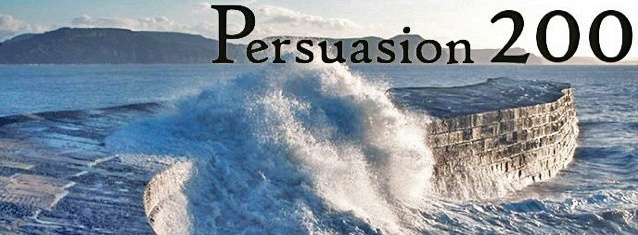 As a tribute to Persuasion, Austen’s touching story about second chances for love, the authors of Austen Variations are retelling Persuasion in ‘real time’ by writing the book's missing scenes. Some will be new scenes and some will be existing scenes from the book but told from a different character’s point of view.
As a tribute to Persuasion, Austen’s touching story about second chances for love, the authors of Austen Variations are retelling Persuasion in ‘real time’ by writing the book's missing scenes. Some will be new scenes and some will be existing scenes from the book but told from a different character’s point of view.Just to add to the fun, we’ll be creating more than a dozen prequel scenes such as Captain Wentworth’s original proposal to Anne, their broken engagement, and major events from the dashing Captain’s naval career.
Here's a glimpse of Captain Wentworth's naval exploits.
The Taking of the Laconia, by Jack Caldwell
The West Indies Campaign of 1804–10 was a series of military contests mainly in the Caribbean, spanning the Napoleonic Wars, involving the European powers of Napoleonic France, the Batavian Republic, Spain, the Kingdom of Portugal, and the United Kingdom of Great Britain and Ireland.
French naval power after Trafalgar in 1805 was weak. The big ships that had survived were trapped by the Royal Navy’s blockade of French and Spanish ports in Europe. Therefore, France and Spain used smaller, fast ships, such as frigates, in the Caribbean to harass British trade. They also made extensive use of privateers under letters of marque.
~*~
The following takes place approximately one year after Anne Elliot breaks off her engagement to Frederick Wentworth.Autumn of 1807, off Santo Domingo in the West Indies
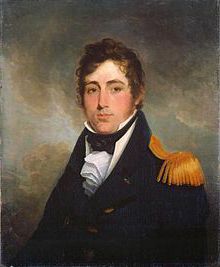
Commander Frederick Wentworth, seated in the bow of his captain’s launch, raised a telescope towards the target for tonight as the boat glided gently through the calm Caribbean waters. He could just make out the lights adorning the frigate in the gloom of the warm, moonless dark. It was a delightful night for murder and mayhem.
Suddenly, there was a splash behind him. Wentworth turned, but his rebuke died on his tongue. Stokes, at the tiller, was already admonishing the perpetrator.
“Mind the noise, damn you,” was the boatswain’s harsh whisper. “Pull soft, like the Cap’n said.” The sailors manning the oars redoubled their effort to row the little boat quietly. The crews in the other boats were silent, as well.
They had to be; their lives depended on it. One mistake and they would all die. Such were the risks of this feat of maritime crime.
Wentworth’s orders from the fleet admiral in Port Royal, Jamaica, were to scout and seek out the enemy, harass them if he could, and report back their location. It was about the only duty appropriate for Wentworth’s command. The HMS Asp was a broken down, 18-gun sloop. Marvelous in its day, after thirty years of service it was better fit for the breaker’s yard than sailing thousands of miles from Portsmouth.
Wentworth cared not. Last year, in the aftermath of his betrayal and rejection by the woman he loved, he was desperate for employment. A newly minted Master and Commander, he should have been like most of his fellows, stranded on shore for lack of a ship. But Lord Keith had been kind—the Good Lord knew why—and Wentworth had been given the Asp. The jealousy in the port had been high, for many other officers with seniority had been passed over. Wentworth felt his luck, and vowed to show them all he deserved it. The Admiralty had given him the tool to advance his career and he was going to make the most of it, or go down trying.
The Laconia was a French frigate manned by privateers sailing under letters of marque. Prowling the waters between Florida, Bahama, and Hispaniola for the last half-year, it had taken several British merchant ships. The situation was intolerable, the admiral said. It was a priority that the Laconia be found and either captured or sunk.
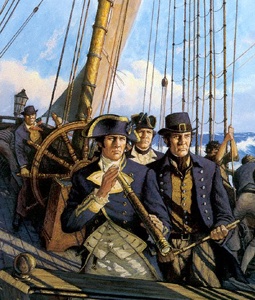 Again, luck was with Wentworth. He had been on his last patrol, preparing to return to England, when he stumbled across the French frigate. He had the weather gage and was able to flee, for the poor, pitiful Asp’s six-pound cannons were no match for the twelve-pounders aboard the Laconia. The French had twice their men and threw four times their weight in metal. It would be suicide to attack the Laconia straight on.
Again, luck was with Wentworth. He had been on his last patrol, preparing to return to England, when he stumbled across the French frigate. He had the weather gage and was able to flee, for the poor, pitiful Asp’s six-pound cannons were no match for the twelve-pounders aboard the Laconia. The French had twice their men and threw four times their weight in metal. It would be suicide to attack the Laconia straight on.But Wentworth knew his chance was upon him. He was determined to take that frigate. He was not going to give the glory to anyone else. He just had to figure out how.
Carefully, using all his skill in seamanship, the Asp shadowed the Laconia. Wentworth’s expectation that the privateers would not be as disciplined as the regular French Navy was proved correct. He soon discovered the frigate’s hiding place: a heretofore unknown bay on the north coast of French-occupied Santo Domingo. Hidden from view by a cape, the ship could sit at anchor and replenish at leisure, all the time keeping look out for any straggling merchantman that might lose the safety of its convoy.
Wentworth and a small party had gone ashore, and for three days together spied on the privateers. He quickly observed that the enemy made the first mistake of a warship at anchor—they thought they were safe. Wentworth planned to take advantage of that.
Back in his tiny cabin aboard the Asp, Wentworth planned and schemed, aided by his able first lieutenant and good friend, Timothy Harville. What Wentworth devised was audacious. If he could not beat the Laconia, he would steal her.
The operation was known as a “cutting-out expedition.” The object was to take a ship whole and sail her away—in effect, to commit grand larceny. To do so was extremely dangerous. It required that the attacking force sneak up on the ship, overpower the guard, lock the rest of the enemy’s crew below decks, cut the anchor cable, and drop sail—all while under fire from shore batteries and other ships. If they could manage it, the successful crew would share in the prize money the navy offered. Fail and they would be prisoners or dead.
What made the operation even more difficult was that the only way to approach a ship unseen was to do so at night. That in itself was difficult. To successfully complete an operation that required complete surprise, split-second timing, and close-coordination in darkness required boldness, training, and luck. They also needed the target to be inattentive. Wentworth was counting on all of it.
The Asp slowly drew close to shore after dark, launching all its boats. The tide would turn shortly after midnight, and by then, Wentworth needed to be in control of the frigate so that the outgoing tide would help them escape. If they attacked too soon, they would remain an easy target for a counter attack until the zenith of high tide.
Half the crew of the Asp was assembled in the boats. Wentworth was in his launch and planned to attack by the stern. He had the boatswain, Stokes, and much of his larboard gun crews with him. Harville and the marines would hit the starboard side, while a party in the jolly boat would go to the chains in the bow, cut the cable, and make for the sails. The Asp would be under the command of the second lieutenant, James Benwick. It was unusual for the captain of the ship to be involved in such an operation, but Wentworth would not send anyone else to do something so dangerous. He was not called “Fightin’ Freddie” by his crew for nothing.
Luck remained with Wentworth. The sea was relatively calm, with only a ripple of a wave—enough noise to cover them, without a rough sea to hinder their progress. The breeze was coming out of the southeast, another stroke of good fortune. Should it hold, it would blow their prize right out of the bay, and the Laconia was the only enemy ship on hand. The only anxiety was the clear skies. Would the stars give enough light to alert the guard? They would soon learn.
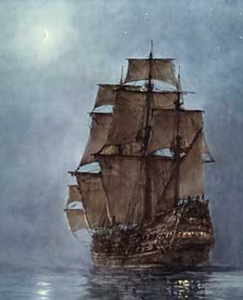 As the little flotilla drew close, they could hear the sounds of celebration from the shore. Wentworth had noted that the crew tended to leave the ship to carouse in the small, rough camp that had been built on the beach. The camp contained stores of food, ammunition, and “entertainments” for the men. Wentworth did not know if the women ashore were slaves, whores, or wives, and he did not care. What he depended on was that they would distract the enemy. Wine, women, and song had been the downfall of many a sailor, and he hoped tonight would be no exception.
As the little flotilla drew close, they could hear the sounds of celebration from the shore. Wentworth had noted that the crew tended to leave the ship to carouse in the small, rough camp that had been built on the beach. The camp contained stores of food, ammunition, and “entertainments” for the men. Wentworth did not know if the women ashore were slaves, whores, or wives, and he did not care. What he depended on was that they would distract the enemy. Wine, women, and song had been the downfall of many a sailor, and he hoped tonight would be no exception.The Laconia lay at anchor about three cable lengths from the breakers—over a quarter mile. It was positioned to sail out, useful in case of emergency, and played right into Wentworth’s hands. The starboard side would be hidden from shore. Unfortunately, the stern was in clear sight. There was nothing for it.
Things are going too smoothly, Wentworth worried. What would go wrong?
Just as the flotilla reached its target, a bell rung out from the Laconia. Midnight, thought Wentworth. Everything is going to plan.
The launch was about a hundred yards away. The crew had raised oars, allowing the boat’s momentum to complete its journey. Wentworth, fingering his sabre, watched the French quarterdeck closely. As far as he could tell, only two men were upon it. Unsteady French voices could be heard singing from below decks. Apparently, carousing was not limited to shore. Wentworth’s military mind was disgusted by the enemy’s lack of professionalism, even though their sloppiness was to his advantage. A dim light glowed from the stern windows. Was the privateer captain aboard?
Another moment, and he would be there…
“Qui est là?”
The shout came from the frigate’s bows. Wentworth, startled, hesitated. Meanwhile, the men on the quarterdeck seemed equally surprised.
“Qu'est-ce que c'est? Que voyez-vous?”
Wentworth was out of time. He gave a hand signal, and the men began to row again. They had to move quickly, stealth be damned.
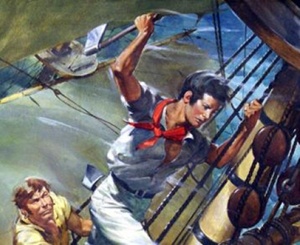 "Ho! Sonner l'alarme! Vite! Sonner—”
"Ho! Sonner l'alarme! Vite! Sonner—”Abruptly, the man’s cries ceased. At that instant, Wentworth’s hand grasped the side of the ship. Quickly, he climbed the wooden wall, his years of experience serving him well. He reached the deck and vaulted over the rail. He drew his sword as he crouched low, taking in his surroundings.
The scene was illuminated by a single lantern stationed next to the compass by the ship’s wheel. Two other men were on the quarterdeck: an ordinary sailor, probably a boatswain’s mate, and a young man wearing the insignia of a lieutenant de fregate. Both men’s attention was towards the bow.
The boatswain’s mate was the first to turn and see him. He cried out and took to his heels. Wentworth charged forward as the privateer officer pulled his sword. He was young, he was brave, and after a couple of passes, he was dead, Wentworth’s cutlass making quick work of it.
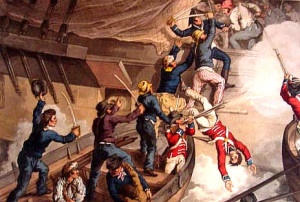 Wentworth sensed more than saw his men dashing past him. Gunshots barked at the waist as the marines with Harville assaulted the frigate’s small guard.
Wentworth sensed more than saw his men dashing past him. Gunshots barked at the waist as the marines with Harville assaulted the frigate’s small guard.“Get below! The noise will raise the crew!” he bellowed to Harville. They needed to trap the privateers below the gun deck, or all would be lost. “Stokes, see to the sails! The rest of you—follow me!”
Wentworth and his men dashed down the ladder to the gun deck. Already, Harville and the marines were in a desperate fight with the privateers. Wentworth grabbed one of his men by the arm.
“Eades, lock down the hatches to the ladders below. Quickly now!” The sailor and another man ran forward while the others joined the battle. Wentworth prepared to join them when he heard a noise behind. A half-dressed man armed with a sword emerged from behind a door.
“Look out, Cap’n!” someone cried.
Wentworth did not hesitate. He drew the pistol stuck in his belt and fired directly into the privateer’s chest. The man fell in a heap. Wentworth turned back to the fight along the gun deck, only to have Harville grasp his arm.
“We have things in hand here, Captain,” his friend cried.
“Right.” Wentworth ran up the ladder to the deck above. The topsails were just falling, he saw. “Stokes! Have we cut loose that blasted anchor yet?”
Stokes had only gone a few steps forward when the ship started to swing around. The boatswain had to steady himself against the mainmast. “I think she’s free, sir!”
Wentworth nodded and made for the ship’s wheel while Stokes cried out orders to the makeshift crew. Sailors and marines secured the rigging, and the sails filled in the wind. Wentworth could feel the ship coming to life under his hands. He strained to remember the course he laid out back in his cabin. Checking the compass, he turned the wheel to starboard.
BOOM! A cannon roared out.
Stokes was at his elbow. “They’re shooting from shore, sir! They’re on to us!”
“Take the helm!” Wentworth commanded. “Make for the middle of the channel. I’ll go forward and guide you.” Without waiting for an acknowledgement of his order, Wentworth made for the bow. A sailor he knew well, Radle, was there, standing over the body of a privateer.
“Hello, Cap’n!” he said good-naturally. “We had a devil o’ a time cuttin’ them cables.”
“Good work, Radle. We’re making for the channel ahead. Relay my directions to Stokes.”
“Aye, aye, sir.”
Wentworth glanced down at the body. His throat had been cut; his blood left a trail to the scuppers. “Who’s this, then?”
“This here’s the bugger that spied us. He was at the heads, he was. Bad luck.”
Wentworth did not know whether Radle meant the bad luck was for the British or the dead privateer. Not that it mattered now. “A point to larboard!”
Radle cried out the course correction and the Laconia moved ponderously to the left. The cannon fire increased from shore, but there was no damage yet; French sailors were notoriously poor gunners, and privateers even worse, unlike their comrades in Napoleon’s Le Grande Armée. Radle turned and patted his rear, taunting the enemy.
“Watch it, Radle—your arse is a big enough target, even for the French.”
The sailor’s answering laugh was cut short. “Boats from shore, sir!”
Cursing, Wentworth left Radle at the bow and returned to the quarterdeck, finding Harville staring aft. A half-dozen rowboats were chasing the ship.
“They’re gaining,” he reported. “I think we’ll need the marines and their muskets.”
Wentworth looked irritably at the impotent stern cannons. The gunpowder was below decks, in the powder room, inaccessible. They would have to go through as many as a hundred trapped privateers to get at it. The aft chasers were useless.
“No, we need more speed. Drop courses.”
Harville nodded and gave the order to lower the main sails. Men scrambled up the shrouds and along the yards. First the mainsail was dropped and secured, and a minute later, so was the foresail. The ship gained speed. Wentworth had taken the wheel again, as Stokes was needed to secure the braces.
“Radle! How are we doing?” he called out.
“Steady as she goes, sir!” was the answering cry. “I spy the old Asp dead ahead!”
There was a shuddering crash. A ricocheting cannonball had struck the aft of the ship, below the stern window. The French had gotten lucky—the rudder was jammed.
“Damn!” cried Wentworth. “Stokes, free the rudder!”
Instantly, orders were given. A sailor was sent down with a rope about him to survey the damage.
“How is it, Lauck?”
The man looked up. “Not bad, sir. Give me a bar, an’ I’ll get her free.”
“Mr. Harville, take over.” Wentworth and Eades went below into the captain’s cabin, all the better to pass Lauck a crowbar to pry the ball loose. There they found a hysterical, half-naked, dark-skinned woman cradling the man Wentworth had shot earlier.
"Bastardo asesino! Lo has matado!"
“I have no time for this!” Wentworth pointed at the woman. “Eades, keep her away from me.” Wentworth opened a window and passed the crowbar out. Glancing up, he saw that the rowboats were still following, but seemed to be falling back.
“I got it out, sir!” cried Lauck.
“Good show!” Wentworth’s return to the quarterdeck was stopped by Eades.
“What am I to do with ‘er, sir?” The Spanish woman was crying uncontrollably.
For a savage instant, Wentworth considered throwing her overboard, but dismissed the thought in the next moment. He only shook his head and returned to the helm.
“That did it, Frederick,” shouted Harville excitably. “They’ll never catch us now!”
“I believe you’re right, Tim. Stokes, send a signal to Mr. Benwick—his course is north-northwest.”
“We’re not returning to Port Royal?” asked Harville.
“No. Too many French and Spanish ships between here and there. We’re making for Nassau.”
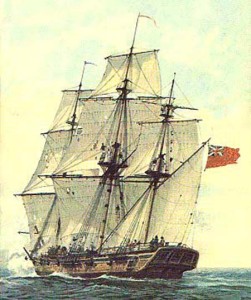 A fortnight later, Wentworth took his ease in his cabin aboard the Asp. The voyage to Nassau, capital of the Bahamas, was relatively uneventful. Wentworth had left the Laconia in Timothy Harville’s hands when he returned to the Asp for the remainder of the trip. Not only was it right and proper to do so, he also left Harville the problem of the late privateer captain’s lover. Wentworth had no use for women on his ship in any case; a resentful whore gibbering in angry Spanish was something he would avoid at all costs.
A fortnight later, Wentworth took his ease in his cabin aboard the Asp. The voyage to Nassau, capital of the Bahamas, was relatively uneventful. Wentworth had left the Laconia in Timothy Harville’s hands when he returned to the Asp for the remainder of the trip. Not only was it right and proper to do so, he also left Harville the problem of the late privateer captain’s lover. Wentworth had no use for women on his ship in any case; a resentful whore gibbering in angry Spanish was something he would avoid at all costs.The enemy captain was buried at sea along with the other dead privateers. British losses were comparably light—two dead and three wounded. It was always hard to bury a shipmate, and this occasion was no exception. However, Wentworth felt hardest for the dead privateer lieutenant. Barely more than a boy, he was struck down just as his life was beginning. This was the evil of war.
Upon dropping anchor in Nassau, a company of Marines was needed to transfer the hungry and thirsty prisoners off the Laconia. Fifty-eight privateers had been trapped below decks, and to keep them quiet, Wentworth limited the amount of food they received. The British held the bread room, after all. Without a fire, they could not cook the nearly inedible meat stored in casks in the hold. The prisoners got just enough to eat to keep them worried that Wentworth would simply starve them out, should they make trouble. Wentworth also let the privateers know that while he considered the ship’s letter of marque legitimate, should anything happen to him, the British Admiralty might take an opposing view. Piracy was a hanging offense, after all.
Food and threats worked, and the prisoners were docile as they left the ship.
The woman was a different matter. She was given parole while on board, of course, but she made it her purpose in life to make things miserable for the British. More than once, she had been locked in her cabin for spitting on English sailors. She was set loose in Nassau. God have mercy on the Bahamians, Wentworth thought.
The officials in Nassau were overjoyed with the seizure of the Laconia. It had been a thorn in the colony’s side, and with its capture, the merchants and planters could breathe a little easier. Cargo coming in and goods shipped out had one less threat.
Wentworth had received permission to take the Laconia back to Plymouth. This was a great honor for him, and excellent news to the crew, for it meant that the Asp would not have to share the prize money with the fleet admiral in Port Royal—something that was in Wentworth’s mind when he chose to sail to Nassau. For Wentworth, the Laconia would be his ticket to advancement; many a commander had been made post for far less.
Captain Frederick Wentworth—how well that sounded! He wondered whether Anne would be pleased when she heard the news—
Frederick Wentworth frowned, as all his resentful anger and wounded pride resurfaced. Anne Elliot, the only woman he had ever loved, had accepted his marriage proposal, only to betray and renounce him days later. All because of her godmother, Lady Russell—the witch! Anne had been convinced by Lady Russell that Commander Wentworth was not good enough for her. She had been persuaded to give him up.
Well, to hell with it! If Commander Wentworth was beneath her, then she was too low for Captain Wentworth!
Frederick Wentworth spent the remainder of the night drinking himself into a stupor before his steward had to help him into his cot to sleep it off.
Come visit Austen Variations to read more of Persuasion 200
 |
| Click the button or HERE to return to the Austen in August main page! |

I love that site, but haven't had a chance to visit all summer since I cut back on webtime for family stuff. I look forward to reading all of Persuasion 200. The authors do such a fab job of filling in all the cracks and crevices to make the story so much richer and fuller. Thanks for sharing!
ReplyDeleteJack does such a great job on the naval escapades of Captain Wentworth! It's easy to overlook how dangerous it was when reading Persuasion because it doesn't touch on the detail, so these are a real treat!
ReplyDeleteI loved this series when it was posted. It is so nice to reread some of these posts. Love Jack's naval scenes.
ReplyDelete